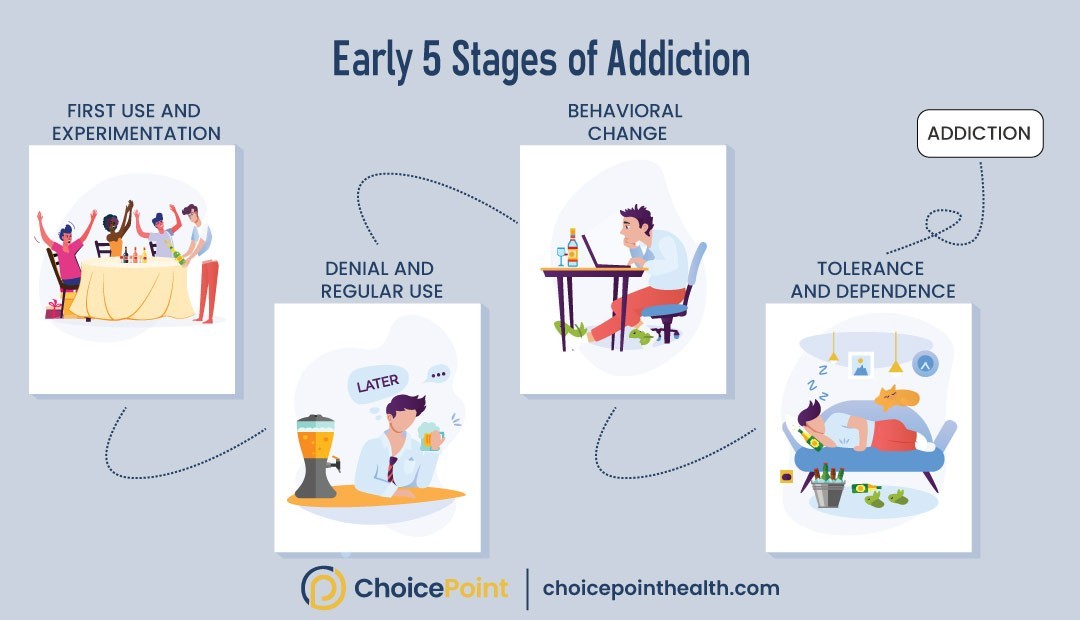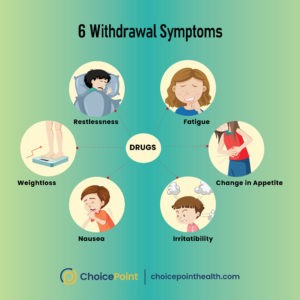Fighting addiction is hard, and recognizing that you are suffering from it is even more challenging. What starts as fun and intentionally ignoring the 5 stages of addiction may lead to an unfulfilled life.
Addiction can happen to anyone regardless of background, ethnicity, or social status. Falling prey to substance dependence might not be your fault, but ruining your life by not giving up an addiction may cost you an unhappy future.
According to the CDC government (Centers for Disease Control and Prevention), approximately 71,000 people died from a drug overdose, making it a leading cause of injury-related deaths in the United States.
So, learn with us what are the early 5 stages of addiction to help you save your life from addiction and mental illness.
Table of Contents
How to Define Addiction?
According to the NIH (National Institute on Drug Abuse), addiction is excessive substance use without considering its harmful consequences on physical and mental health. It is considered both a mental illness and a physical disorder.
The exact cause and identification of the 5 stages of addiction are difficult to pinpoint. It varies from person to person. For some people, abusive family background, family history of drug abuse, and genetic factors become the major contributing factors. Some succumb to addiction due to social factors such as peer pressure, stressful environments, and work influence.
Addiction does not start overnight. It’s a steady yet destructive process. People usually realize they have fallen prey to addiction when it’s too late. It is essential to be aware of the 5 stages of addiction so you or your loved ones can get timely help.
Break the Cycle of Addiction by Recognizing these 5 Stages of Addiction
People give in to addiction because it seems like the only way to escape pain, even for a bit. But is addiction ever a solution? No. It may offer a short relief but takes away everything else, including relationships, careers, and even life.

5 Stages of Addiction
So, examine these 5 stages to see if you or your loved one are suffering from addiction.
Stage1: First Use and Experimentation
Well, it is confirmed that no one tries drugs to get addicted. It usually begins as fun or a new try-out experiment during hangouts with friends. While starting is always fun, the end can be catastrophic.
The first stage of addiction is undoubtedly the most difficult to recognize. No one can tell if this new experimentation will turn into something serious. With less to almost no cravings, it becomes difficult to know if you are developing substance dependency.
Besides peer pressure, stress is a significant factor that pushes people to resort to drugs and alcohol to relieve their tension. Whatever the reason, it is essential to hold yourself accountable while trying out any addictive substance.
This self-assessment will help you determine if your experimentation with drugs and alcohol has gone too far:
- Have you started taking drugs in isolation?
- Are you gradually increasing the dose?
- Has your drug intake increased?
- Have you started hanging out at parties where you can access excessive alcohol or drugs?
Want to have a detailed, personalized, free addiction self-assessment quiz? Click here
Just remember that addiction is a disease that requires medical intervention. If you or your loved one is on the verge of developing substance dependence, you can help them by encouraging them to get timely treatment.
Stage2: Regular Use
In the 5 stages of addiction, denial is the most difficult to deal with. This is because an individual is on the verge of developing addiction but does not accept it. This denial phase delays treatment, ultimately harming the person’s physical and mental condition. Most people tend to ignore this stage because of significantly lesser cravings. However, a person has usually incorporated addictive substances into their daily life. What starts as a temporary habit becomes a dangerous lifestyle.
While drug and alcohol addiction is easier to spot, problems arise with opioids and prescription-based medications. Most people unknowingly abuse prescription-based painkillers such as morphine, which harm physical health, including liver and kidney damage.
Stage3: Social Isolation and Behavioral Change
The greatest giveaway of addiction is perhaps behavioral change along with social isolation. During this stage, most people usually develop recurrent cravings and urges for drugs or alcohol and are usually aware that they suffer from addiction. This leads them to develop secretive behavior, and it becomes the root cause of social isolation.
The red flags to usually look out for are:
- A person becomes less communicative
- Miss out on important social events and activities
- Miss out on work-related commitments
- No focus on self-care and personal hygiene
- Becomes more short-tempered and aggressive
Addiction has many cognitive and psychological effects. Studies show that addiction usually leads to depression and anxiety. A drawback is that this depression pushes a person further down the pits of addiction. ChoicePoint Health offers virtual and outpatient treatment programs so you can start the treatment at your convenience in no time.
Stage4: Tolerance and Dependence
Tolerance happens when a user feels unwell until he/she takes an increased dose level. Regular use increases psychological and physical reliance on drugs. Thus, users must intake higher, stronger, and more frequent doses to reach the same physical response and mental relief.
Tolerance is categorized as short-term, long-term, or learned based on the type of substance and period required to develop tolerance. Dependence is when a person stops substance intake, and their body withdraws. Withdrawal is the combination of physical and mental responses that appear when a person stops or lessens drug use. As a result, the user’s body requires a drug dose to avoid withdrawal symptoms.

6 Common withdrawal symptoms
Intensity and type of withdrawal symptoms vary concerning the type of drug. The most common withdrawal symptoms include:
- Congestion
- Fatigue
- Irritability
- Muscle pain
- Nausea
- Changes in appetite,
- Restlessness
- Irritability
Coping with withdrawal symptoms alone is difficult as some intense symptoms force relapse. Do you have drug dependence? Feel welcome to contact ChoicePoint Health; we’ll help you cope.
Stage5: Substance Use Disorder
At the final stage, the substance of choice becomes a part of the patient’s life. Patients cannot live and perform everyday life functions without taking them. Patients continue taking drugs despite devastating consequences on mental and physical health, personal relationships, and social image. If you have ignored the earlier four stages of addiction, you don’t need to worry, as you still have a chance to cure it.
Substance use treatment requires:
Moreover, it would be best if you took the various behavior-changing therapies for changing the destructive mindset with constructive ones for lifelong recovery.
Conclusion: Recognizing the 5 Stages of Addiction
At ChoicePoint, we provide all personalized addiction treatment programs, including telephone-based treatment and outpatient and intensive outpatient addiction treatment programs. Patients can avail these programs according to their schedule and comfort. We start the process of treating addiction by knowing the underlying causes of addiction. Our seasoned therapists spend time with each patient through individualized therapy programs and correlate with medical experts and detox specialists to design your addiction recovery plan.
Medical Disclaimer:
ChoicePoint aims to improve the quality of life for people struggling with substance use disorder and mental health issues. Our team of licensed medical professionals research, edit and review the content before publishing. However, this information is not intended to be a substitute for professional medical advice, diagnosis, or treatment. For medical advice please consult your physicians or ChoicePoint's qualified staff.









Review Early 5 Stages of Addiction Most People Tend to Ignore.